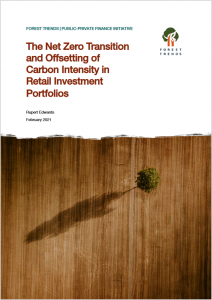The Net Zero Transition and Offsetting of Carbon Intensity in Retail Investment Portfolios
By Rupert Edwards View PublicationThe financial sector is witnessing a rapid evolution in climate metrics, driven by both regulatory pressure and consumer-driven trends toward sustainable investment, helping investors prioritize lower carbon investments.
Overlooked to date has been the potential for product offerings that mobilize demand for carbon offsets from investors. This paper argues that the development of consumer-facing financial technology platforms and leadership by some investment managers should provide an opportunity for retail investors to go further––not only to prioritize lower carbon or climate transition strategies, but additionally to use offsets to immunize against residual carbon intensity in pension or other savings vehicles. Carbon footprint metrics can provide a hook for retail investor willingness-to-pay to mitigate greenhouse gas emissions and to achieve net zero.
Governments and regulators can encourage this trend in order to enhance the financial sector’s role in the climate transition: Firstly, to reinforce corporate action in the real economy. Secondly, to secure very large-scale private co-funding for public climate finance in developing countries, including for Nature-based Solutions and REDD+, critical to achieving the goals of the Paris Agreement and to minimizing the global economy’s costs of transition to climate stability.

